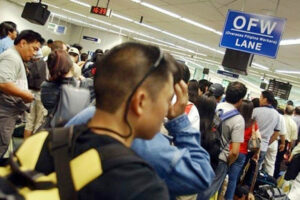
Financial literacy courses urged for OFWs
THE GOVERNMENT needs to develop programs to enhance financial literacy, social protections and skills among overseas Filipino workers (OFWs), according to a discussion paper issued by the Philippine Institute for Development Studies (PIDS).
“Results of primary data collected from interviews with selected OFWs and their family members suggest that young OFWs dream of retiring early but may not be provided systematic support for financial literacy,” it said in a paper, “Long-Term Effects of Labor Migration in the Philippines.”
The paper, written by Jose Ramon G. Albert, Ma. Teresa Habitan, Aubrey D. Tabuga, Jana Flor V. Vizmanos, Mika S. Muñoz and Angelo C. Hernandez, concluded that the government must promote financial literacy programs to help “futureproof” OFWs and their dependents.
“Financial literacy programs can educate OFWs on managing their earnings, savings, and investments, encouraging them to invest in sustainable projects that contribute to the economic development of the Philippines,” it said.
“The government has been providing some financial literacy programs and tried to provide better financial instruments for OFWs through the OFW Bank,” it said.
It also cited initiatives by the Bangko Sentral ng Pilipinas to improve financial literacy among OFWs.
“The communication of government initiatives to improve the financial literacy and stability of OFWs has, however, not been systematic enough to make a solid impact,” it added.
The Philippine Statistics Authority’s Survey on Overseas Filipinos indicated that remittances were primarily used for consumption (47.4%), followed by savings (24.8%) and investments in property, business ventures and financial instruments (12.6%).
Remittances typically account for 10% of gross domestic product. The central bank estimates that cash remittances rose 2.8% to $30.211 billion in the first 11 months of 2023.
The PIDS paper also pointed to the need to improve social protection plans such as health insurance, pension, unemployment benefits, and other safety net schemes.
“Advocating for family reunification and extending access to social protection programs for OFW families is paramount,” it said.
“Furthermore, addressing mental health and providing essential social support to both OFWs and their families is equally vital. OFWs are at a higher risk of developing mental health problems due to the stress of working abroad and separation from their families,” it added.
It also called on the government to develop programs that will help upskill OFWs.
“Additionally, developing comprehensive skills development and training programs, especially focusing on digital and soft skills, will prepare OFWs with future skills to provide them with more competencies,” it said.
“These programs should also help facilitate their integration into the host country’s society as well as assist them to preserve their cultural identity,” it added. — Luisa Maria Jacinta C. Jocson



